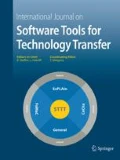Abstract
Hardware scheduling is a well-known and well-studied problem. This paper defines a new SAT-based formulation of automata-based scheduling and proposes for the first time a completely new resolution algorithm based on SAT solvers and bounded model checking (BMC).
The new formulation is specifically suited to control-dominated applications. Alternative executions are modeled as concurrency, where alternative behaviors are followed in parallel. This approach produces “single-path” scheduling traces instead of standard “treelike” solutions, thus enabling the use of BMC. This choice, however, creates the problem that resource bounds are treated incorrectly, due to the artificial concurrency modeling alternative behaviors. We then discuss how to take this into account, either by modifying the SAT solver or by adding extra clauses. Thus we are able to exploit SAT-based BMC to find the desired minimum latency schedule.
Our method shows significant improvements in terms of both computational efficiency and modeling power, when compared to the BDD-based approach, and in terms of the optimality of the results when compared to heuristic methods.
Similar content being viewed by others
References
Cabodi G, Kondratiev A, Lavagno L, Nocco S, Quer S, Watanabe Y (2003) A BMC-Formulation for the Scheduling Problem in Highly Constrained Hardware Systems. In: BMC’03: First International Workshop on Bounded Model Checking, Boulder, Colorado, July
Cabodi G, Kondratiev A, Lavagno L, Nocco S, Quer S, Watanabe Y (2004) A BMC-Formulation for the Scheduling Problem in Highly Constrained Hardware Systems. In: Strichman O, Biere A (eds) Electronic Notes in Theoretical Computer Science, vol 89. Elsevier
Cabodi G, Nocco S, Quer S (2003) Improving SAT-based bounded model checking by means of BDD-based approximate traversals. In: Proc. conference on design automation and test in Europe, Munich, Germany, March 2003, pp 898–903
Cabodi G, Quer S (2004) URL: http://staff.polito.it/{gianpiero.cabodi,stefano.quer}/
Gebotys C (1993) Throughput optimized architectural synthesis. IEEE Trans VLSI Syst 1(3):254–261
Goldberg E, Novikov Y (2002) BerkMin: a fast and robust SAT-solver. In: Proc. conference on design automation and test in Europe, Paris, February 2002, pp 142–149
Goldberg E, Prasad M, Brayton R (2002) Using problem symmetry in search based satisfiability algorithms. In: Proc. conference on design automation and test in Europe, Paris, February 2002, pp 134–141
Gupta S, Dutt N, Gupta R, Nicolau A (2003) SPARK: A high-level synthesis framework for applying parallelizing COMPILER TRANSFORMATIONS. In: Proc. international conference on VLSI
Haynal S (2000) Automata-based symbolic scheduling. PhD thesis, University of California at Santa Barbara, December 2000
Haynal S, Brewer F (1998) Efficient encoding for exact symbolic automata-based scheduling. In: Proc. international conference on computer-aided design, San Jose, CA, November 1998, pp 477–481
Haynal S, Brewer F (1999) Automata-based scheduling for looping DFGs. Technical report, University of California at Santa Barbara, October 1999
Hwang C-T, Lee J-H, Hsu Y-C (1991) A formal approach to the scheduling problem in high-level synthesis. IEEE Trans Comput-Aided Des 10:464–475
Khouri KS, Lakkshminarayana G, Jha NK (1999) High-level synthesis of low-power control-flow intensive circuits. IEEE Trans Comput-Aided Des 18(12):1715–1729
Lakshminarayana G, Khouri KS, Jha NK (1999) Wavesched: a novel scheduling technique for control-flow intensive design. IEEE Trans Comput-Aided Des 18:505–523
Paulin PG, Knight JP (1989) Force-directed scheduling for the behavioral synthesis of ASICs. IEEE Trans Comput-Aided Des 8:661–679
Radivojevic I, Brewer F (1996) A new symbolic technique for control-dependent scheduling. IEEE Trans Comput-Aided Des 15(1):45–47
Wakabayashi K, Tanaka H (1992) Global scheduling independent of control dependencies based on condition vectors. In: Proc. 29th conference on design automation, Anaheim, CA, June 1992, pp 112–115
Wang CY, Parhi K (1995) High-level DSP synthesis using concurrent transformations, scheduling, and allocation. IEEE Trans Comput-Aided Des 14:274–295
Author information
Authors and Affiliations
Corresponding author
Rights and permissions
About this article
Cite this article
Cabodi, G., Kondratyev, A., Lavagno, L. et al. A BMC-based formulation for the scheduling problem of hardware systems. Int J Softw Tools Technol Transfer 7, 102–117 (2005). https://doi.org/10.1007/s10009-004-0170-9
Published:
Issue Date:
DOI: https://doi.org/10.1007/s10009-004-0170-9




